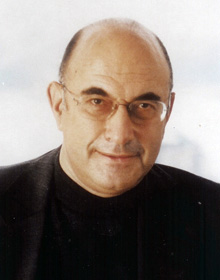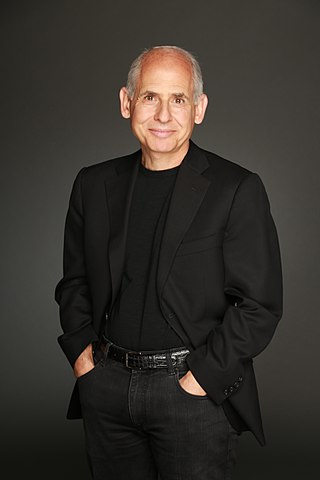| Neuropsychology |
|---|
 |
Richard Restak (born 1942) is an American neurologist, neuropsychiatrist, author and professor.
| Neuropsychology |
|---|
 |
Richard Restak (born 1942) is an American neurologist, neuropsychiatrist, author and professor.
Restak is a graduate of Gettysburg College and Georgetown University School of Medicine. He performed his postgraduate training in New York City at St. Vincent's Hospital (Manhattan), where he completed his internship. His first psychiatric residency was also in New York City at Mount Sinai Hospital. This was followed by two residencies in Washington, D.C.: a psychiatric residency at Georgetown University Hospital and a residency in neurology at George Washington University Hospital. [1]
Restak maintains a private medical practice in neurology and neuropsychiatry in Washington, D.C., where he is also a Clinical Professor of Neurology at George Washington Hospital University School of Medicine and Health.
He has to date written 20 books on various aspects of the human brain; two were on The New York Times Best Sellers List. His first bestseller, The Brain (1984), was also the first companion book he wrote for a PBS series. The Mind (1988) was another PBS companion book and was his second bestseller. He has written articles for various national newspapers and has appeared on radio and television programs. [2] [3] [4] He has penned dozens of articles for national newspapers including: The Washington Post, The New York Times, The Los Angeles Times, USA Today, and The Huffington Post. He has contributed brain and neuroscience-related entries for the Encyclopædia Britannica and the Encyclopedia of Neuroscience.
He is a Clinical Professor of Neurology at George Washington University School of Medicine & Health Sciences.
As a regular lecturer, both nationally and internationally, he has presented commentaries for both Morning Edition and All Things Considered on National Public Radio and made numerous appearances on leading television talks shows including: the Today Show , Good Morning America , the Discovery Channel, and the PBS NewsHour .
He has appeared as an expert witness for the defense in the high-profile trial of Mir Aimal Kasi, the Pakistani national charged with the 1993 shootings at CIA headquarters in Langley, Virginia. During the trial Restak testified that Kasi was missing tissue from his frontal lobes, a congenital defect that affected his ability to judge the consequences of his actions. [5] [6]

Cognitive neuroscience is the scientific field that is concerned with the study of the biological processes and aspects that underlie cognition, with a specific focus on the neural connections in the brain which are involved in mental processes. It addresses the questions of how cognitive activities are affected or controlled by neural circuits in the brain. Cognitive neuroscience is a branch of both neuroscience and psychology, overlapping with disciplines such as behavioral neuroscience, cognitive psychology, physiological psychology and affective neuroscience. Cognitive neuroscience relies upon theories in cognitive science coupled with evidence from neurobiology, and computational modeling.

Neuropsychology is a branch of psychology concerned with how a person's cognition and behavior are related to the brain and the rest of the nervous system. Professionals in this branch of psychology focus on how injuries or illnesses of the brain affect cognitive and behavioral functions.
Capgras delusion or Capgras syndrome is a psychiatric disorder in which a person holds a delusion that a friend, spouse, parent, another close family member, or pet has been replaced by an identical impostor. It is named after Joseph Capgras (1873–1950), the French psychiatrist who first described the disorder.

The brain is the central organ of the human nervous system, and with the spinal cord, comprises the central nervous system. It consists of the cerebrum, the brainstem and the cerebellum. The brain controls most of the activities of the body, processing, integrating, and coordinating the information it receives from the sensory nervous system. The brain integrates the instructions sent to the rest of the body. The brain is contained in, and protected by, the skull of the head.
Cognitive neuropsychiatry is a growing multidisciplinary field arising out of cognitive psychology and neuropsychiatry that aims to understand mental illness and psychopathology in terms of models of normal psychological function. A concern with the neural substrates of impaired cognitive mechanisms links cognitive neuropsychiatry to the basic neuroscience. Alternatively, CNP provides a way of uncovering normal psychological processes by studying the effects of their change or impairment.

Walter Jackson Freeman II was an American physician who specialized in lobotomy. Wanting to simplify lobotomies so that it could be carried out by psychiatrists in psychiatric hospitals, where there were often no operating rooms, surgeons, or anesthesia and limited budgets, Freeman invented a transorbital lobotomy procedure. The ice-pick transorbital approach, a transorbital lobotomy, involved placing an orbitoclast under the eyelid and against the top of the eye socket; a mallet was then used to drive the orbitoclast through the thin layer of bone and into the brain. Freeman's transorbital lobotomy method did not require a neurosurgeon and could be performed outside of an operating room, often by untrained psychiatrists without the use of anesthesia by using electroconvulsive therapy to induce seizure and unconsciousness. In 1947, Freeman's partner James W. Watts ended their partnership because Watts was disgusted by Freeman's modification of the lobotomy from a surgical operation into a simple "office" procedure.
Anthony David FMedSci is a British neuropsychiatrist based at University College London. Previously tenured as professor of cognitive neuropsychiatry and Vice Dean at the Institute of Psychiatry, King's College London, since 2018 he has been Director, University College London, Institute of Mental Health. He is the father of Rebecca David, a Senior Campaign Manager at Influencer LTD and Michael David a junior doctor.
Witzelsucht is a set of rare neurological symptoms characterized by a tendency to make puns, or tell inappropriate jokes or pointless stories in socially inappropriate situations. It makes one unable to read sarcasm.
Neuropsychiatry is a branch of medicine that deals with psychiatry as it relates to neurology, in an effort to understand and attribute behavior to the interaction of neurobiology and social psychology factors. Within neuropsychiatry, the mind is considered "as an emergent property of the brain", whereas other behavioral and neurological specialties might consider the two as separate entities. Those disciplines are typically practiced separately.

Elkhonon Goldberg is a neuropsychologist and cognitive neuroscientist known for his work in hemispheric specialization and the "novelty-routinization" theory.

Kenneth M. Heilman was an American behavioral neurologist. He is considered one of the fathers of modern-day behavioral neurology.

Daniel Gregory Amen is an American celebrity doctor who practices as a psychiatrist and brain disorder specialist. He is the founder and chief executive officer (CEO) of the Amen Clinics. He is also the founder of Change Your Brain Foundation, BrainMD, and Amen University. Discover Magazine recognized Amen's research on PTSD and Traumatic Brain Injury (TBI) as one of the top 100 science stories of 2015. He is a twelve-time New York Times best-selling author as of 2023.
Paul Rodney McHugh is an American psychiatrist, researcher, and educator. He is currently the University Distinguished Service Professor of Psychiatry at the Johns Hopkins University School of Medicine, where he was previously the Henry Phipps Professor and director from 1975 to 2001.
Clinical neuroscience is a branch of neuroscience that focuses on the scientific study of fundamental mechanisms that underlie diseases and disorders of the brain and central nervous system. It seeks to develop new ways of conceptualizing and diagnosing such disorders and ultimately of developing novel treatments.
The American Neuropsychiatric Association (ANPA) is a non-profit organization of professionals in neuropsychiatry, behavioral neurology and the clinical neurosciences, with over 700 members from around the world. Established in 1988, its mission is to improve the lives of people with disorders at the interface of psychiatry and neurology, with the vision of transforming recognition, understanding and treatment of neuropsychiatric disorders. It founded in 1988 by two academic physicians doubly certified in neurology and psychiatry, Barry S. Fogel and Randolph Schiffer.

Hans-Lukas Teuber was a professor of psychology and head of the psychology department at Massachusetts Institute of Technology. He was one of the founders of neuropsychology and studied perception. He coined the term double dissociation. He also introduced the "Corollary Discharge" hypothesis. He gave the classic definition of agnosia as "a normal percept stripped of its meaning".
David McKenzie Rioch was a psychiatric research scientist and neuroanatomist, known as a pioneer in brain research and for leading the interdisciplinary neuropsychiatry division at the Walter Reed Army Institute of Research (1951–1970), a program that contributed to the formation of the then-nascent field of neuroscience.

Barry S. Fogel is an American neuropsychiatrist, behavioral neurologist, medical writer, medical educator and inventor. He is the senior author of a standard text in neuropsychiatry and medical psychiatry, and a founder of the American Neuropsychiatric Association and the International Neuropsychiatric Association.
F. Markus Leweke is a German psychiatrist and psychotherapist. He is a professor and Chair in Youth Depression Studies at the Brain and Mind Centre of the University of Sydney, Australia and a work group leader at the Central Institute of Mental Health in Mannheim, Germany.

Joel Salinas is an American-born Nicaraguan neurologist, writer, researcher, and an assistant professor of neurology at Harvard Medical School. He practices general neurology, with subspecialty in behavioral neurology and neuropsychiatry, at the Massachusetts General Hospital in Boston, Massachusetts. He is also a clinician-scientist at the Harvard T.H. Chan School of Public Health and the Framingham Study at the Boston University School of Medicine.